MEN’S BASKETBALL: For Alex Copeland ’19 and UC Irvine’s Max Hazzard, NCAA tournament berths turn middle-school dream to reality
Best friends, high school rivals and conference tournament MVPs guide two squads with Cinderella potential
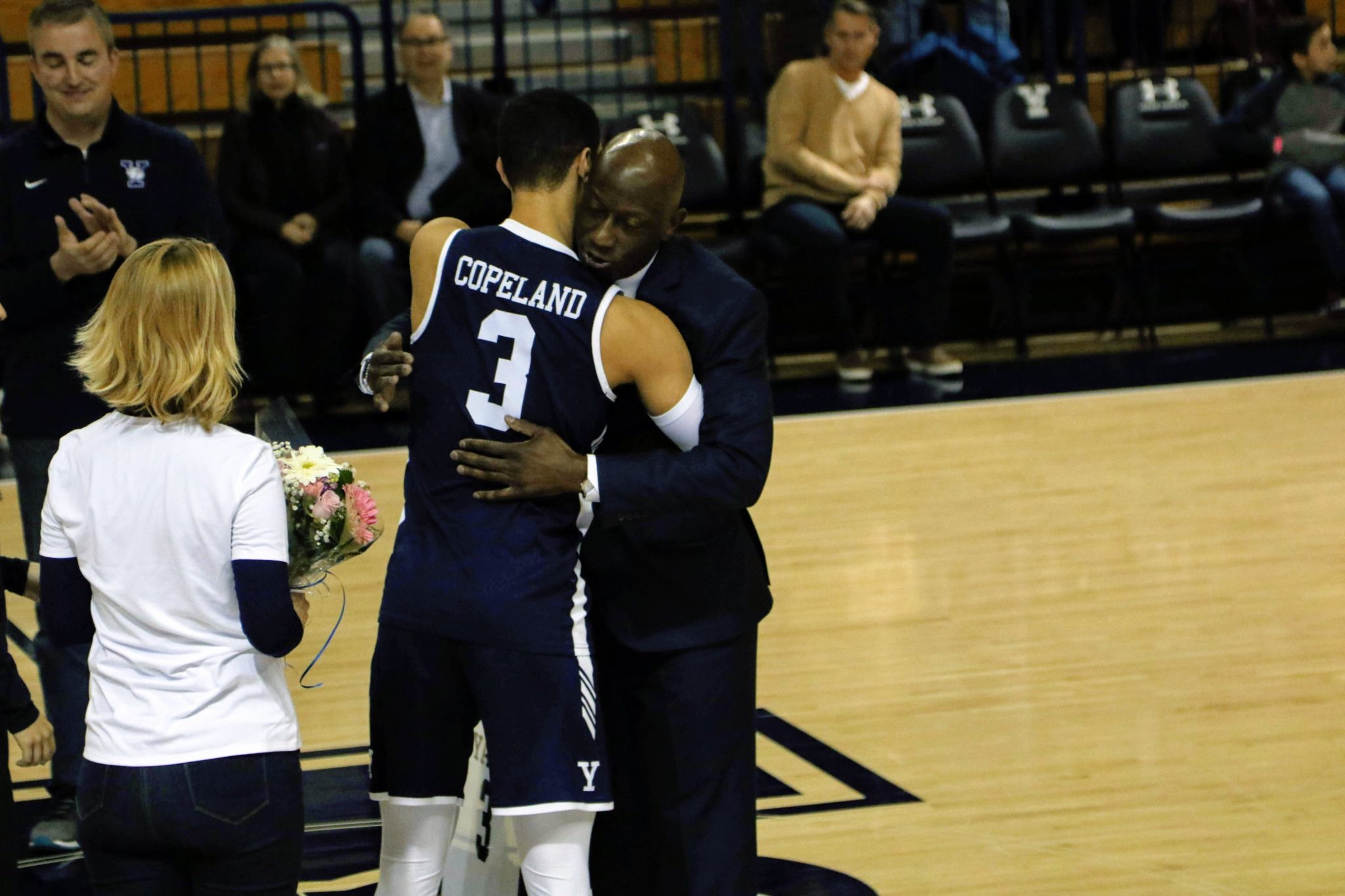
Yale men’s basketball guard Alex Copeland ’19 knew he needed a good sleep before an Ivy Madness final against Harvard on Sunday. The senior dropped 16 points in a six-point semifinal win over Princeton Saturday afternoon, setting the stage for a Harvard-Yale matchup that would send the Elis to March Madness.
There was only one issue. UC Irvine (30–5, 15–1 Big West) guard Max Hazzard — Copeland’s best friend, former rival in Los Angeles’s Mission League and the Anteaters’ leading scorer — was preparing to lead his then-29-win squad over Cal State Fullerton in the Big West tournament championship, a contest that did not tip off until midnight on the East Coast. The Yale (22–7, 10–4 Ivy) senior, who said he talks with Hazzard every day and tunes into as many Irvine games as he can, settled on a compromise.
“I knew that I had to wake up early for our game against Harvard, so I sent him a really long text right before I went to sleep,” Copeland said. “I ended up waking up at four a.m. and checking it, and I saw that they won. I remember just smiling and feeling so overwhelmed and then going to bed with a smile…When I woke up, I then texted him and we talked a little bit and he said, ‘Hey man, go get it… I’m proud of you, whatever happens today.’”
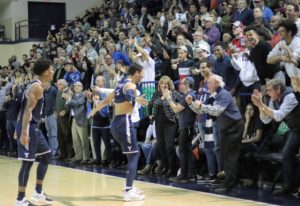
Six hours and 25 points later, Copeland had earned the chance to dance too, setting up a special conclusion to his college career, throughout which he and his California counterpart have continuously offered each other support. Both the Big West and the Ivy League named Hazzard and Copeland — who scored a combined 48 points in their championship victories — the most outstanding players of their respective tournaments. Although they are unlikely to meet in an NCAA tournament game, the duo now seek to help their teams — which have both received positive press as popular upset picks on opposite sides of the bracket — to Cinderella runs.
The pair first met early in middle school when they participated in a volleyball game in which sixth graders from their respective elementary schools would compete every year. When Copeland enrolled at Harvard-Westlake in seventh grade, mutual friends helped them develop a relationship that emerged as they faced each other in basketball games a few times a year — some for AAU and others when Campbell Hall, where Hazzard attended middle school, met Harvard-Westlake.
While Copeland continued at Harvard-Westlake after eighth grade — when both say they began to consider each other really close friends — Hazzard started at Loyola High School. As freshmen, they made the varsity basketball teams of two schools that boast what Hazzard called “maybe the biggest rivalry in southern California.”
“In high school, we played them twice a year,” Hazzard said. “When I was in eighth grade and I’m sure when he was in eighth grade too, just kind of looking at that rivalry was so crazy. And it seemed super far fetched, you know, to actually be in that game…Neither of us really played in that game [freshmen year], but it was still cool to be on opposite ends — me and my best friend.”
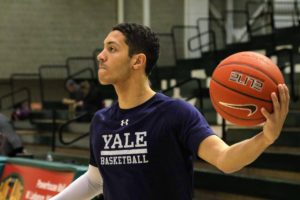
Two disappointed freshmen stuck on the bench, Copeland and Hazzard had a sleepover the night after their first rivalry bout, prophesying future success, a high school rivalry they would come to headline and even an article someone would author about them one day. It was perhaps the first of many times the duo would support each other in their respective basketball careers with their fair share of peaks and pits. Copeland said he remembers the night — and how they dreamed of everyone coming to watch them play — vividly.
They were right. Both became starters as sophomores and took the reins as top options during junior and senior year. When Harvard-Westlake and Loyola met, LA fans all knew the two dueling guards were close, and Copeland and Hazzard competed for how many times a partisan crowd would chant and clap, “AC’s better” or “Max is better.” The rivalry grew to the point that Loyola and Harvard-Westlake would play in college gyms, including Cal State LA and Cal State Northridge, in order to accomodate the crowd.
In fact, Yale’s game at CSUN earlier this season offered Hazzard the opportunity to see Copeland and Yale play live for the first time. His family met Copeland’s for dinner before enjoying a 94–90 Yale win in overtime. Though it was only the first time Hazzard saw his best friend play in the Blue and White firsthand, he has followed Yale closely, and Copeland has reciprocated with his interest in the Anteaters.
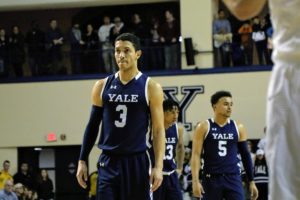
Attending schools on opposite coasts, the pair connect electronically, FaceTiming each other and offering support from their respective time zones. Relying on each other across the course of college careers that have featured thrilling successes and frustrations — like those that underscored how the duo felt as overlooked freshmen in the Mission League — has largely contributed to their on-court success.
“I think basketball can become a huge part of your identity and your self-worth, and I think when things aren’t going well, you kind of can take that really, really hard,” Copeland said. “I know for me and for Max as well, we’ve both had moments where we wanted to quit it…We’ve had so many talks at two a.m. just saying if I have a bad game or a bad stretch of games, Max tells me don’t get too high, don’t get too low, you’re going to be alright, you’re a great player, I’m proud of you, I love you and all that type of stuff. We’ve had so many moments where we’ve been there for each other.”
Copeland has also helped Hazzard overcome persistent shoulder injuries throughout his career at UC Irvine. A redshirt junior, the Second Team All-Big West guard underwent shoulder surgery freshman year before tearing his labrum in the first twenty minutes of a UC Irvine exhibition game at the beginning of the 2017–18 season.
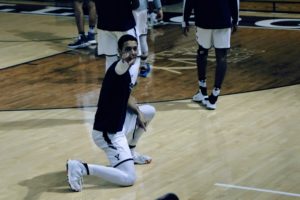
The Anteater guard, whose 12.5 points a game this season rank among the Big West’s 10 most prolific scorers, also knows guard Miye Oni ’20, who has worked out at CSUN over the summer, and another Los Angeles native on the Elis, guard Michael Feinberg ’22. In talking to Copeland so frequently, he has met many of his best friend’s teammates, who understand how much a joint berth in the NCAA tournament means to the pair.
“I don’t know Max personally, but it means the world to Alex,” guard Azar Swain ’21 said. “It’s something that he and Max have talked about for years and for them to live out their dreams of playing in March Madness together is probably like a dream come true.”
Connections abound for many Bulldogs. Oni’s cousin Michael Oguine, another Los Angeles product who played at Chaminade Prep High School, plays guard for No. 15 Montana. Meanwhile, Swain played on the same AAU team, the Connecticut Elite, as LSU guard Tremont Waters in the sixth grade.
As the Round of 64 draws nearer, several college basketball analysts, as well have fans, have identified both UC Irvine and Yale as underdog teams that could shock the nation with significant postseason runs. FiveThirtyEight gives No. 13 UC Irvine a 23 percent chance to defeat No. 4 Kansas State in the South, the greatest chance they offer to any team seeded thirteen or above. According to their model, No. 14 Yale has a 16 percent chance of beating No. 3 LSU.
“For him to be going dancing and to get their conference tournament MVP and then for me to do that…I don’t think I would have believed you [at the start of this season], but Max really gave me a lot of inspiration,” Copeland said. “For us both to do it, it feels so surreal and it feels so much bigger than that article that we thought would get written about us in high school.”
William McCormack | william.mccormack@yale.edu .







